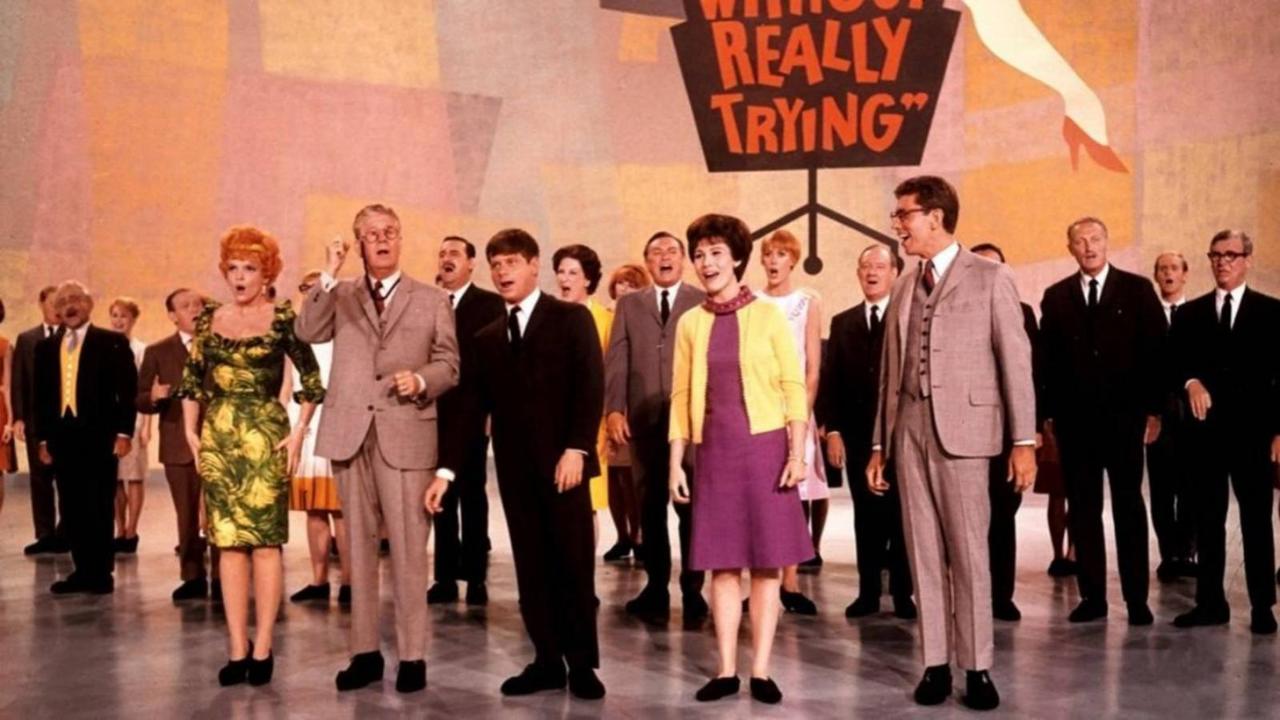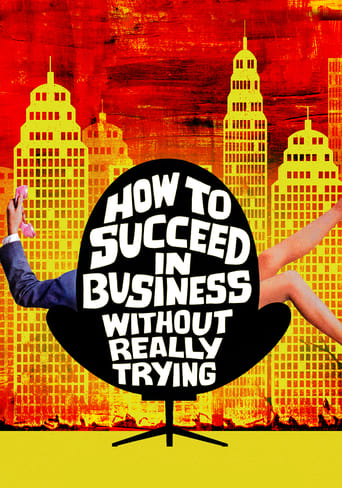



Awesome Movie
The film makes a home in your brain and the only cure is to see it again.
View MoreThere are moments that feel comical, some horrific, and some downright inspiring but the tonal shifts hardly matter as the end results come to a film that's perfect for this time.
View MoreI enjoyed watching this film and would recommend other to give it a try , (as I am) but this movie, although enjoyable to watch due to the better than average acting fails to add anything new to its storyline that is all too familiar to these types of movies.
View MoreCynics may say that the film merely copied the play, which was ALREADY a smash. Bad argument. Whether this film merely copies a superb piece of entertainment which already existed, or takes an existing work to the next level is irrelevant. It is superb and it holds up extremely well. Morse is nothing less than brilliant as both the lead character and the "master of ceremonies" who is always talking directly to the audience. I have seen this at least half a dozen times and every time I have to ask myself, why was Morse not known for other roles aside from this? He had talent. It is one of those odd Hollywood quirks that sometimes an actor will become known for just one role. In this case one is more than enough. Michelle Lee is not only glamorous but intelligent, a mix that was rare in the era. Those same cynics will tell you that mores have changed and the workplace is not like this anymore. They are wrong. The same games exist, the rules have changed slightly. Guaranteed entertainment.
View MoreDefinitely a product of the 1960's, this film version of one of the longest running shows of that decade hasn't done bad for one that seemed to be almost forgotten until the release of the video in the early 1990's and the two subsequent Broadway revivals. The movie isn't totally faithful to the original show, and several of the show's best songs are cut out to be heard simply over the action. But to cast the show's original star, Robert Morse, repeating his role as J. Pierpont Finch, was a testament to how the producers really made an effort to transfer the show to screen with dignity. Certainly, Morse had gone onto a fairly successful film career, and even if he's a bit older than when he created the role, his boyish charm is certainly present.Finch is a window washer who reads the title book and longs to make it as an employee of World Wide Wickets (whatever wickets are.....) and hired to work in the mail room, he soon schemes his way out of there, gaining the attention of practically everybody in the company, including the romantic aspirations of secretary Michelle Lee. With that gorgeous smile and winning personality, Lee (who took over the role of Rosemary in the original Broadway production), is excellent, and those who only know her as Karen from "Knot's Landing" will find her totally down to earth personality refreshing. Rudy Vallee adds charm to his otherwise pompous character of J.P. Bigley, the big boss, and Ruth Kobart brings an earthiness to the otherwise hardboiled executive secretary. When she breaks out in her beautiful singing voice in the 11:00 number, "Brotherhood of Man", she may have you cheering! Anthony Teague is appropriately smarmy as the company snitch, and Kay Reynolds adds "the perfect pal" quality to Rosemary's friend, Smitty, especially playing matchmaker in the delightful "Been a Long Day" where three characters express their thoughts out loud in song as they prepare to leave for the day and find a way to get Finch and Rosemary together for their first date. Busty Maureen Arthur adds a Lorelei Lee like sensibility to her otherwise dumb sexpot Hedy LaRue. Individual performances playing the various secretaries and executives are too many to mention, but everybody contributes. Frank Loesser's score is brilliantly rousing, a fine successor to his most remembered Broadway show, "Guys and Dolls", and includes one of the finest songs about self-confidence ("I Believe in You") which actually reveals the lead character's hidden insecurities.Of the songs cut from the show, "Paris Original" is perhaps the most missed, but it really didn't move the plot along, so I can understand why it ended up being cut. In a movie era where most movie musicals were epics or lavish spectacles, "How to Succeed" is a simple delight, filled with many fun moments, and is certainly worthy of repeat viewings.
View MorePlot: The ultimate self-help book success story, with a little song and dance tossed in. Drive-in Rating: Yield right of way. Odd musical but one that's clearly got legs since it's enjoyed Broadway revivals. My first choice for movie remake lead is Jonah Hill as J. Pierpont Finch, the scruffy, slightly dopey, enjoyably conniving, and unconventional lead played in the movie by Robert Morse. Costumes and set decoration are ultra 60's for those who are retro fans. The movie was best when you could chart Morse's ladder-climbing by the hour or day, but toward the end you lose sight of the timer and it becomes a little less amusing. Still a worthy commentary on modern-day business.
View MoreIf the movie seems "dated" today (and it does), it's not just because the men wear tightly tailored narrow-collared gray suits, stovepipe trousers, and short haircuts. It's not the apricot carpets either. It seems dated because now the cynicism that informs it is taken for granted. It's presented as amusing and shocking but a modern audience is likely to shrug and say, "So what?" When I was in college, Macchiavelli, author of "The Prince," an essay on how to manipulate people in order to bend them to your will, was considered a bible of rotten conniving. I recently saw a paperback copy of "The Prince" with a cover illustration. The giant palm of your hand, with "the world" in it. (Read this book and you have the world in the palm of your hands -- get it?) Macchiavelli, the lying, greedy, underhanded suppurating scum, The Prince of Darkness, has become a modern hero.The movie's no longer as shocking as it was in the mid-1960s, but it's still very funny. J. Pierpont Finch (Robert Morse) is a window washer who happens upon a book, "How to Succeed in Business Without Really Trying." By simply following instructions he manages to worm his way into a huge company that manufactures and distributes wickets. He starts in the mail room and rises in a few days to Chairman of the Board through deception and skulduggery. In the last scene he is introduced to the President of the United States.What's a wicket, you ask. Nobody knows. The play doesn't show us any, or describe any, or tell us what they look like or what they do. The business is content-free. I am referring here to the "business" because that's the metaphor used in the story. You can substitute any other bureaucracy that fits the model if you like -- a hospital, a government. The point of the story is the same as that of Macchiavelli's book -- not wickets but power.I don't really want to get into the movie in detail because it would involve giving away too many amusing sight gags and bits of dialog. Much of the success is owed to the smoothly practiced cast. It looks like a filmed play in which the actors know their roles inside and out. Robert Morse is quite good. He's clever but he looks cute in a boyish way, with those gapped incisors. He uses his cuteness as a tool but convinces us that this is part of the character, not the actor. Now, don't get me wrong. I don't personally think he's cute or handsome. I don't know why the secretary, Michelle Lee, falls for him. Why, hell, on a bad day I'm ten times as handsome and cute as Robert Morse. Come to think of it, I'm not sure he's so "cute" after all. Furthermore, when he sings he sounds like Marlene Dietrich did in "Destry Rides Again" when she jiggles her speech organs between thumb and forefinger.The songs are usually sprightly, sometimes sweet, and the lyrics have to be heard to be fully appreciated. One falls a little flat -- The Brotherhood of Man. It works if taken to be meant as the baloney that it so obviously is. None of the tunes is really powerful, though "I Believe In You" is, marginally, a standard today. I'd have enjoyed seeing more vigor in the songs and dances. Bob Fosse would have done wonders with the numbers but then it would have turned the film upside down. The songs are only ancillary. The real story depends on plot and character and doesn't need too much music because it would be a distraction.There are some laugh-out-loud moments in it, and it's well worth seeing.
View More